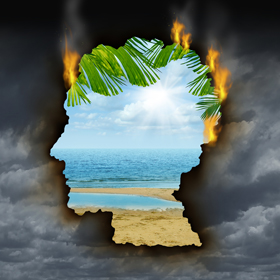Your Anxiety: Friend or Foe?
 What exactly is anxiety? Is it something to be dreaded or avoided? Is there anything useful or important about anxiety? Is anxiety a friend or a foe? Technically anxiety is a form of fear. Fear is a universal emotion, experienced in all cultures and across time throughout human history (all animals experience it too). Like all emotions, fear and anxiety serve useful functions even if the experience is not comfortable. Positive emotions like love and joy create pleasurable, engaging feelings that we typically want to hold onto. Difficult emotions like anger and fear typically create uncomfortable, distressing experiences that we want to get out of. But if you fearfully avoid situations habitually or too frequently, then you end up making fear your foe—and it can become a relentless one until you learn to face it (fortunately effective therapy for fear, anxiety, and stress is available). First let’s look at how fear, at its very core, when functioning naturally and effectively, is actually your friend.
What exactly is anxiety? Is it something to be dreaded or avoided? Is there anything useful or important about anxiety? Is anxiety a friend or a foe? Technically anxiety is a form of fear. Fear is a universal emotion, experienced in all cultures and across time throughout human history (all animals experience it too). Like all emotions, fear and anxiety serve useful functions even if the experience is not comfortable. Positive emotions like love and joy create pleasurable, engaging feelings that we typically want to hold onto. Difficult emotions like anger and fear typically create uncomfortable, distressing experiences that we want to get out of. But if you fearfully avoid situations habitually or too frequently, then you end up making fear your foe—and it can become a relentless one until you learn to face it (fortunately effective therapy for fear, anxiety, and stress is available). First let’s look at how fear, at its very core, when functioning naturally and effectively, is actually your friend.
While at times very uncomfortable, fear and anxiety is not usually your enemy. Fear and its related emotional states are responsible for the survival of the species because they warn you to avoid danger. If you did not have this evolutionary warning system, then when something truly dangerous presented itself, you would be at increased risk of getting harmed, injured, or even killed. This is because fear jolts the nervous system, kind of juices it up, to make your mind and body quickly take emergency measures to avoid getting harmed. So in this sense fear is a true ally, a true friend. Fear also has other positive values. It not only alerts to the presence of danger out in the world, but a bit of anxiety can accompany bodily responses as well. When you get anxious about various unexpected aches, pains, tingles in your body, then fear is alerting you to the possibility of disease or physical injury to possibly get needed medical treatment. Fear also can accompany your thinking, and manifests as worry or apprehension. In this case it causes an intense inner focus on thoughts and ideas: You may feel vague apprehensions and worries because you have forgotten something important, and your anxiety is pulling you inward to try and remember it. You may feel the tug of anxiety as you turn over thoughts about an important project, an issue in a love relationship, or are inwardly reflecting about a difficult dilemma. The fear is helping you to probe, think, and ponder all the different dimensions of the inner problem you are trying to solve.
Fear can also be your friend when it causes you to look at your life in a broader way, taking on an existential quality—am I leading the right kind of life? This can happen when one day you wake up and really take stock of your life direction. What am I moving towards in my life that is meaningful, important, and makes life worthwhile? If in fact you haven’t really examined your life and are on “autopilot”, your fears, worries, and apprehensions about your life direction can cause you to reflect deeply on what makes life worth living. In essence, you become concerned and worried about habitual, deadening modes of existence that rob you of a sense of purpose and meaning in life (e.g. too much TV, video, media, food, alcohol, and other distractions). Such reflection can then lead to taking meaningful action to attain a life worth living.
Our fear is a tricky critter though and has another, all too familiar side. Normal, helpful or friendly fear can appear to turn on you, causing torment and despair. When this occurs fear has you in its grip and is no longer helpful or “friendly”. The turning of fear upon the self happens when you lose track of the helpful and positive messages in fear and start viewing situations, thoughts, inner feelings, and outer circumstances in an overly threatening, scary manner. You actually contribute to this process through habitual avoidance of situation and activities that are not truly dangerous, which heightens your fear response, and leads to more avoidance. This progression is helped along by failing to understand the positive function of “friendly fear or anxiety”. Life inevitably has ups and downs. The downs inevitably cause some pain and are distressing. When you seek to avoid life’s inevitable pains, then the pain becomes more than just pain—you begin to fear it, start avoiding it, and never learn to accept and confront it. Life is bearable when you accept its inevitable ups and downs, but becomes truly unbearable, when you fear and automatically seek to avoid.
Here fear is no longer your friend, and is now becoming your foe or enemy. Essentially you are now overreacting to life’s expected flow of difficulties and you have given your power away to your fears. Because fear now involves intense suffering and does not easily go away when outer and inner circumstances are actually safe, it seems intolerable, insurmountable, and you want to escape this horrible situation at all costs. Fear or anxiety then inflects or turns upon itself and you may develop fear of having fear itself. When you are afraid of your natural fear response, a vicious cycle of fear and avoidance can develop: since you do not want to feel fear, you avoid it at all costs, but when you avoid something that is not truly warranted by the circumstances, you never learn to figure out that there is nothing to be afraid of. Unfortunately irrational, unwanted fear can attach to just about anything: specific situations (driving, heights, bridges, enclosures, etc), social situations (ranging from small talk to speaking up in a group), being out in public, and you may even fear your own emotions (e.g. rather than accept emotions like occasionally getting angry or frustrated, you fear your own emotions—you may be afraid to show or even feel anger; some people are even afraid of positive feelings like love, because they fear getting hurt),
Fear can now become quite irrational and persistent. The end result is getting locked in a vicious cycle of fear and avoidance. If fear were compared to a dog, it is chasing its own tail. At this point your exaggerated fear response may become a full blown Anxiety Disorder. However, thankfully there is actually a very effective and direct method to overcome your irrational fears: you can slowly learn to confront them (yes, they will actually go away the more you do so) and accept, without avoiding, life’s inevitable ups and downs. Actively seek to learn from your fear. Clarify if there is anything important it is trying to tell you (fear as friend) or does it have you in its grip, coloring and twisting your thoughts and perceptions (fear as foe). To confront ones fear by not avoiding the feared situation, you take your power back and return it to its natural state as just one emotion among many that are there to serve you.
If you are struggling with anxiety, fear, stress or other important unresolved issues, you deserve to get the help you need to lead a better, more fulfilling life. Feel free to call me anytime. It can be a great relief to open up about your concerns to a trained professional.
Thank you for reading this article and I hope it was helpful. Good luck! Please post your comments or reactions on my website. To get more information on important wellness and mental health issues please go to The Ryan Review.
PTSD, Traumatic Stress, and You!
 What is trauma, how does it affect you, and what can you do to overcome it? If you or a loved one has experienced a recent or past trauma, been abused as a child or in a current relationship, you may have Post Traumatic Stress Disorder (PTSD) or a related trauma based response. Trauma causes reactions like PTSD but also depression and other anxiety disorders like panic, phobia’s, chronic worry or Generalized Anxiety Disorder, hypervigilance, numbing of normal responding, mistrust of others, social anxiety disorder, and many other concerns, especially substance abuse. Generally speaking if you successfully resolve the trauma, it will also help to reduce or eliminate other related symptoms!
What is trauma, how does it affect you, and what can you do to overcome it? If you or a loved one has experienced a recent or past trauma, been abused as a child or in a current relationship, you may have Post Traumatic Stress Disorder (PTSD) or a related trauma based response. Trauma causes reactions like PTSD but also depression and other anxiety disorders like panic, phobia’s, chronic worry or Generalized Anxiety Disorder, hypervigilance, numbing of normal responding, mistrust of others, social anxiety disorder, and many other concerns, especially substance abuse. Generally speaking if you successfully resolve the trauma, it will also help to reduce or eliminate other related symptoms!
Approximately 15 to 25% of any traumatic event leads to the development of PTSD and especially severe traumas called “high magnitude trauma” may double this rate! Interpersonal violence, such as torture and assault, and prolonged and/or repeated events such as childhood sexual or physical abuse, are more likely than natural events (like earthquakes or natural disasters) to results in a traumatic response. PTSD involves a cluster of three key symptoms:
- re-experiencing (nightmares, flashbacks, or intrusive thoughts/images)
- increased arousal (feeling on edge, easily startled, chronic tension or worry)
- avoidance or numbing of responsiveness (avoiding situations related to the trauma, like where it happened, or learning to numb out your normal responsiveness to life)
The type, amount or duration, and age at exposure to trauma all play a role in its development. While psychological trauma can occur at any point in the lifespan, trauma has its most profound impact when it occurs during early childhood or adolescence and becomes less pervasively damaging with later onset. Trauma that occurs during these developmentally vulnerable times can lead to PTSD, and/or an array of other difficult conditions and symptoms.
The term “complex PTSD” was coined by Dr. Judith Herman in 1992 to describe the effects of early trauma. “Complex” traumas often involve parents, siblings or caretakers as perpetrators, and tend to occur multiple times while the emerging self is forming. These types of traumas cause disruptions in fundamental relationships. When trauma occurs during childhood, is frequent or prolonged, and/or involves interpersonal abuse (such as childhood sexual or physical abuse), other distressing symptoms in addition to PTSD may develop. These symptoms include: disturbances in emotional development, problems with clear thinking, physical illnesses, and potentially serious disruptions in your relationships or ability to connect with others.
Successful Treatment of Trauma and PTSD: There are effective, therapeutic approaches to address past trauma based on rigorous scientific research: Prolonged exposure therapy, cognitive processing therapy, and EMDR. All of these therapies are helpful in that they allow you to process traumatic material in various ways. For any therapy to be truly effective you need to develop a solid, trusting relationship with your therapist and be ready to work on these issues. Since trauma, especially when encountered in childhood, can affect your connection with others, the link formed between your therapist and you is very important. The degree you feel connected to your therapist will help you gradually confront what happened to you. Disclosing and processing traumatic material (memories, images, related thoughts and feelings) is the primary way of recovering from Trauma and PTSD. The goal is to confront rather than avoid traumatic material and also to create a coherent life history that contains both the trauma story as well as your personal successes. Successful treatment would gently encourage you to feel and engage the emotions associated with the trauma as you progress in therapy. By doing so you can move beyond your trauma and into a life worth living!
If you are struggling with trauma, PTSD, anxiety and depression or other important unresolved issues, you deserve to get the help you need to lead a better, more fulfilling life. Feel free to call me anytime. It can be a great relief to open up about your concerns to a trained professional.
Please post your comments or reactions on my website. Thank you for reading this article and I hope it was helpful. Good luck! To get more information on important wellness and mental health issues please go to The Ryan Review.
Creating a Timeline for Growth, Healing & Development
 Do you ever look at your life and consider where it is going? According to Socrates, “The unexamined life is not worth living”. In this sense knowing yourself, where you came from (and where you are headed), leads to a “life worth living”. One special technique to understand your life involves creating a therapeutic Timeline, described below. Examining your life means understanding the personal history involved in your story or narrative, helping you establish and define your unique individual identity. Personal identity leads to a greater sense of integrity and even success. According to Dr. Lila Swell, “Your identity and your success go hand in hand. Many people sacrifice their identities by not doing what they really want to do and that’s why they’re not successful”. A Timeline, such as the one described below, is a detailed exercise to enhance self-awareness, self-definition, and promote your sense of personal identity. Also, by taking a really close look at your life and its direction, you may identify times where you got stuck that prevent you from moving forward. By using a Timeline, you can work through these blocks and make better choices for a successful life aligned with your unique individual self.
Do you ever look at your life and consider where it is going? According to Socrates, “The unexamined life is not worth living”. In this sense knowing yourself, where you came from (and where you are headed), leads to a “life worth living”. One special technique to understand your life involves creating a therapeutic Timeline, described below. Examining your life means understanding the personal history involved in your story or narrative, helping you establish and define your unique individual identity. Personal identity leads to a greater sense of integrity and even success. According to Dr. Lila Swell, “Your identity and your success go hand in hand. Many people sacrifice their identities by not doing what they really want to do and that’s why they’re not successful”. A Timeline, such as the one described below, is a detailed exercise to enhance self-awareness, self-definition, and promote your sense of personal identity. Also, by taking a really close look at your life and its direction, you may identify times where you got stuck that prevent you from moving forward. By using a Timeline, you can work through these blocks and make better choices for a successful life aligned with your unique individual self.
Instructions: Each year of your life starting with your birth (0-1 years old), write out a detailed description of the following to create a map of important life experiences. The purpose of a Timeline is to chronicle your personal history to gain a coherent picture of you: where you were, where you are, and to make better choices about where you may be going. A thorough Timeline can take dozens of hours to complete! It is important not to hurry and to take your time. View the formation of your Timeline as a process and try to write something as often as you can, like a couple of times a week or even more.
Try to go in chronological order but it is OK to go out of order if you want to focus on a particular period. Be sure to fill the gaps in eventually. Early years (0-18) are particularly important, especially childhood and puberty, but later years are important as well. Be thorough in your descriptions and know that you may encounter various emotions as you revisit important events. Once you have worked on a period of time, deeply reflect on this period in your life. If you are in therapy, bring it in to talk to your psychologist or therapist.
Age: Your age. Try to go in increments of one year (e.g. years 0-1, 1-2, 2-3, 3-4…)
Residence and Description: Describe in detail where you lived, what the neighborhood was like, how you felt about the residence and neighborhood or any other important detail that stands out. This can provide a physical context for the events that you experienced.
Important people in my life: Who were the important people in your life at this time? Be sure to include parents, siblings, key friends, other important relatives, teachers, etc. Think carefully about your relationship to each person (or if too young to recall, what you know about your relationship from others).
- Describe both positive and negative qualities in that relationship. Be honest and refrain from editing out negative qualities and only focusing on the positive ones.
- Comment on any problems in the relationship and how you felt at the time.
- Comment on how you feel now as you look back.
School/Work: If it applies, where did you go to school or work at the time?
- Describe the place and your feelings about it, both good and bad.
- Did anything important happen at school or work at that time?
- What was your typical day like?
Important Events and my Reaction to Them: During this time in your life, what important events stand out? For instance, did you have any special achievements or were there any challenges or difficulties?
- What were the difficulties like losses of family members, accidents, medical illnesses, etc?
- What were the special achievements or surprises?
- What was your reaction to these important events and most importantly, what impressions have they left on you? Comment on how they shaped you.
My Observations of This Year: Look back on the year and ask yourself, “What stands out?” How did these events affect you at that time?
- In looking back, what do you currently make of your experiences at that time in your life?
- Are there any lessons you learned or patterns that got set up at this time?
If you want to explore your life, enhance self-awareness, and develop a healthy sense of who you are, then you should begin a Timeline right away! Appreciating significant, impactful life events can help you tune into yourself, producing better life decisions, and understanding your unique self (see article “… A Path With Heart”). Keep in mind that if you are completely honest with yourself you will encounter both positive and negative experiences that shaped who you are in both positive and negative ways! Do not ignore or minimize the negative influences, even if they are painful to look at. True growth is not possible without at least some pain. At some point it can be very helpful to open up about your feelings to a trained professional. In this capacity, as a psychologist with an appreciation for the importance of feelings, emotional growth, and tuning into your unique self, I would be happy to help. Feel free to call me anytime.
Please post your comments or reactions on my website. Thank you for reading this article and I hope it was helpful. Good luck! To get more information on important wellness and mental health issues please go to The Ryan Review.




